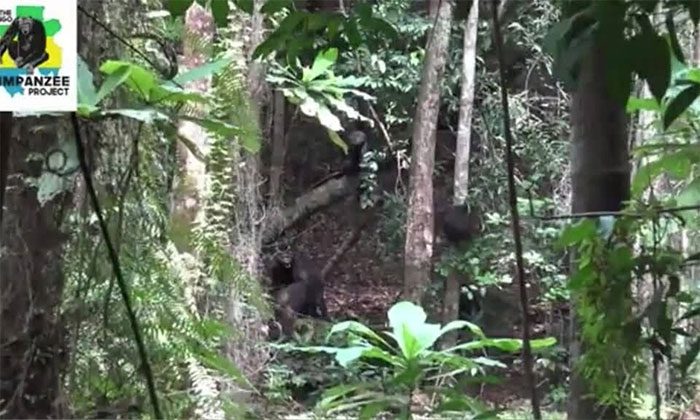Scientists Witness Chimpanzees Killing Gorillas in Two Attacks in West Africa National Park
For the first time, a research team from the University of Osnabrück and the Max Planck Institute for Evolutionary Anthropology in Germany observed a group of chimpanzees (Pan troglodytes) attacking a troop of five western lowland gorillas (Gorilla gorilla gorilla) on February 6, 2019. The gorilla troop consisted of three females and an infant, along with the dominant silverback male.
The chimpanzees attacked and killed the gorilla infant. (Video: Live Science).
“The silverback gorilla threw several chimpanzees into the air; it was truly trying to protect itself and its troop,” said Simone Pika, a co-author of the study and cognitive biologist at the University of Osnabrück. Although the silverback injured three chimpanzees, it was ultimately outnumbered. In the end, the chimpanzee troop captured the gorilla infant and beat it to death.
This same group of chimpanzees attacked gorillas again in December of the same year, killing another gorilla infant. “This reveals to us the potential for violent behavior in chimpanzees, the richness of their behaviors, and their ability to coordinate with each other,” Pika shared.
Chimpanzees and gorillas typically coexist peacefully as their habitats overlap in the Central African rainforest. The two primate species usually avoid each other and do not conflict even when feeding on the same types of fruit, according to Pika. However, chimpanzees are very aggressive in defending their territory against other chimpanzees and are willing to kill members of rival chimpanzee troops.
The scientists followed the chimpanzees involved in the gorilla killings as part of a long-term study on the behavior of this species in Loango National Park in Gabon. When the first attack occurred, the chimpanzee troop had just finished a territorial patrol and was returning.
“Initially, we only noticed the chimpanzees’ screams and assumed it was a typical encounter between individuals in the neighboring chimpanzee community,” said Lara M. Southern, the lead author of the study and a PhD student at the University of Osnabrück. “But then we heard chest thumping, a typical display behavior of gorillas, and realized the chimpanzees were fighting with the gorilla troop.”

The attack may stem from competition for food resources.
The battle in February 2019 lasted 52 minutes. The gorilla troop was forced to retreat without the infant. The research team was unsure if the second incident in December 2019 targeted a different gorilla troop. They published their findings on July 19 in the journal Scientific Reports.
Pika could only speculate about the reasons behind these unprecedented attacks. Chimpanzees sometimes hunt animals like monkeys, and they might have seized the opportunity to kill a small gorilla for food. However, the chimpanzee troop did not display typical predatory behavior, according to Pika. For example, they only consumed one gorilla infant and only one individual fed on the carcass instead of the entire troop sharing it.
The attacks may arise from competition for food resources. Fruits are scarce for both chimpanzees and gorillas in February and December, the times when the attacks occurred, leading to increased competition for food. Climate change is also reducing the availability of fruit in the Gabon rainforest, creating more competition and resulting in aggressive behavior. The research team is currently continuing to investigate the causes of these incidents and monitor chimpanzee behavior.




















































